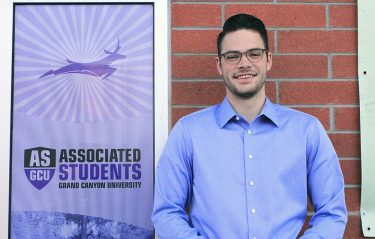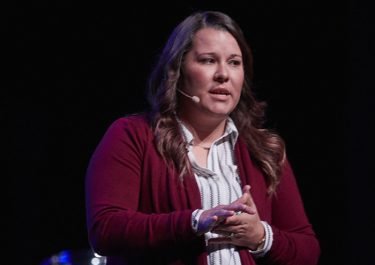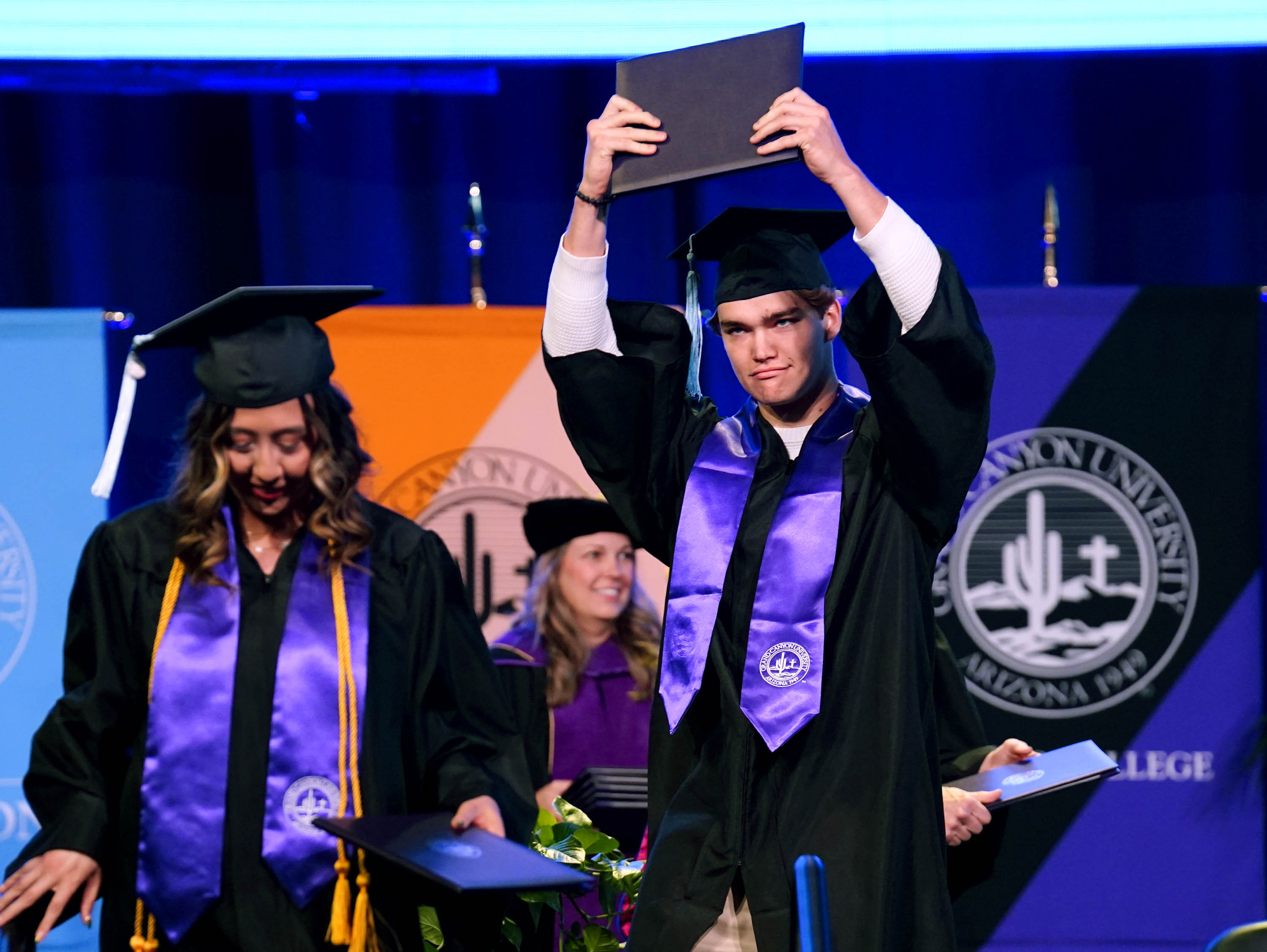
By Lana Sweeten-Shults
GCU News Bureau
Jesi Weeks has been on the front line.
She has seen students in emotional pain. She has felt their heartbreak. Her heart has sunk to hear about students who just want to go home. Who miss their family. Who can’t see beyond finals. Who feel alone.
The Grand Canyon University Residence Life Manager felt all those things as a GCU resident director.
“That’s why I think I’m really passionate about this,” Weeks said from her office in Residence Life. “I want students to know, ‘Hey, we care about you as an individual. Your health, physically and mentally, we want to make sure they are not alone – to feel they’re seen, they’re heard and to feel loved.”
According to a 2016 survey of students by the American College Health Association, 52.7 percent of students reported feeling things were hopeless and 39.1 percent reported feeling so depressed it was difficult to function during the past 12 months. That statistic was cited by the American Psychological Association on its website, with the APA noting that college campuses are experiencing a “mental health crisis.”
A 2016 report from the Center for Collegiate Mental Health, referenced in a May 24, 2017 article in USA Today College, says that, among students seeking counseling, mental health being listed as a reason for seeking help has steadily climbed between 2010 and 2016.
It’s why the University has put various mental health resources in place. Students might not know about those resources or might be unwilling to take advantage of them because of the stigma associated with mental health issues.
Those statistics are also why students have taken steps to make their fellow Lopes aware of the help available to them.
The Associated Students of GCU, partnering with the College of Humanities and Social Sciences, the College of Theology, the Office of Student Care and the National Society of Collegiate Scholars, has scheduled Embrace Week for March 12-15. The event encourages students to check out the mental health resources available to them and to help end the mental health stigma. The week includes stress ball-building, a prayer walk, Stomp Out the Stigma, and workshops about everything from anxiety to suicide awareness.

ASGCU Student Body President Nate Carpenter said when he and Vice President Matt Shinn ran for office, one of their platform issues was addressing mental health in a new way.
“We are both very passionate about the topic, as we saw firsthand the effects it has -- we both served as freshman resident assistants,” Carpenter said, adding how students “really open up to you” as an RA.
“People get burned out. They get tired, depression sets in, homesickness sets in, anxiety with class,” he added. “You start to really identify and realize who you are and start to deal with things from your past you haven’t dealt with before, so it’s just a culmination of everything.”
He talked, especially, about freshman male students, who get overlooked.
“Freshman guys are rowdy. They’re the fun life of the campus. In those quiet times, though, they start to try to figure out who they are and try to figure out where their life is going …”
Carpenter keeps specifics out of the conversation when it comes to the confidential talks he has had with fellow students as an RA. But the big message is that everyone struggles with mental health and students shouldn’t be reluctant to seek help.
“When they get the help they need, you see the heaviest weight and burden of the world come off them, and it’s just phenomenal. Obviously, it’s not just an overnight kind of thing, but it’s a very nice process to see take place.”
On the front line with the RA's are GCU’s Life Leaders, who provide Christian leadership on the campus.

“We have over 200 Life Leaders who are our first line of defense,” Director of Spiritual Life Danielle Rinnier said. “That’s kind of a first point of connection for many students on campus. So they know their Life Leader, who either connects them to us or that will be the first person they go to to say, ‘I’m struggling.’”
Two or three Life Leaders are on every floor of campus living areas and typically share suites with the RA’s.
Rinnier said students may stop by Spiritual Life to talk to someone about an “everyday burden – relationship struggles, struggles with family or ‘I’m having a hard time in school’ or ‘I have questions about God’ or those types of things,” Rinnier said.
The College of Theology also offers emotional support and recently led a celebration of life service for the College of Science, Engineering and Technology after a beloved faculty member passed away. Spiritual Life is doing the same, by planning its first campus-wide Celebration of Life ceremony for 8 p.m. April 17 on the Quad.
Rinnier said Spiritual Life works closely with Student Care because “sometimes for students, it can be confusing between when do I really need to seek more structured, professional help and when might I just need someone to pray with me over the everyday burden of life?
“If it crosses over and it turns into more of a, maybe I have thoughts about harming myself, that sort of thing, we’ll typically say, ‘Thanks for sharing that, but the best step from my perspective would be to connect you with Student Care and the resources they offer.’”
Signs to look for
Kristan Farley, a campus therapist in the Office of Student Care, helps students with struggles beyond those everyday life burdens.
When it comes to watching for more serious signs in someone’s mental or emotional health, she said to watch for extreme changes in mood or personality.
“Are they eating more or less than normal, or is there a big change in behavior? Or are they sleeping a lot more or less? Are they isolating themselves when they normally love to go out?” she asked.
She said to watch for drastic mood fluctuations, startle responses, nightmares or overreactions to simple stressful events.
“Those all could be signs a person is not managing their anxiety or depression and needs assistance or support from a counselor,” she said.
Farley added, “Some other things you might notice: Being paranoid, hearing voices, seeing things that aren’t there – a pattern of innuendos about ending their life or making off-the-cuff general statements like, ‘Things would be better if I were not around,’ that are more than just over-reactive statements. These are more serious and need to be addressed as soon as possible.”
Weeks said a roommate often will notice something isn’t quite right: “'My roommate says she wants to die.’ Please report it so we can follow up.”
Even less severe comments, such as “I’m really sad” or “I wish I weren’t here,” “As minor as those words sound, they’re triggers for our RA’s/RD's,” said Weeks.
Crisis situations
If a student has an immediate concern about a fellow student, the first step is to alert an RA, who will then connect with a resident director about the situation for further followup. An RD is on call 24 hours a day.
“The leadership in the campus living areas will always be your best point of contact,” Weeks said. She emphasized how it’s their role to know their students.
Once the RA and RD connect, depending on the language used, the RD will contact campus safety to assist with a wellness check.
“The RD or RD-on-call goes with a Public Safety team,” Weeks said. The goal is to speak with the student in as comfortable a setting as possible.
“It gives the student the opportunity to speak for themselves,” Weeks said.
The team also contacts EMPACT, a professional suicide prevention center, which can do an assessment. If the center thinks the student won’t be safe through the night, EMPACT will take the necessary steps from there.
The next day, a team meets to go over student welfare reports.
“We have a group on campus called the Behavioral Intervention Team,” said crisis therapist Emalee Grant of the Office of Student Care. “This team reviews reports about concerns for students’ well-being and determines appropriate responses and care for the student.”
Weeks said, “Every student is unique. We put together an action plan that best serves the student.”
Counseling
Outside of crisis situations, students may visit the Student Care counseling center for more voluntary, traditional counseling services.
“They have to, of their own free will, come to want to see us,” Farley said.
The center, which is free to ground students, offers group meetings.
“We have 12 groups a week right now, and there’s anywhere from four to 12 people in each group,” Farley said. “We see somewhere around 160 individual appointments a week, and then in groups, probably around 100 students in groups each week.”
She added, “We have a group on anxiety, for example. A lot of students don’t realize there are a lot of other students who feel the same way they do, and they can kind of sit in the group and share, ‘Oh, I’m stressed out about my schedule.’ They realize other students have the same type of anxiety, and then we can kind of give them coping tools.”
Sessions are offered weekly. Students also may request individual sessions in which a campus therapist sees the student every three to four weeks.
“If they need weekly counseling, we have a good resource of referrals in the community where they can go.” Farley emphasized, “We are a short-term, solution-focused counseling center.”
According a May 4, 2017 article by the University of Pennsylvania, the Center for Collegiate Mental Health 2016 Annual Report noted that the top mental concern was anxiety, followed by depression, relationship problems, stress, family, interpersonal functioning and academic performance.
Weeks said Residence Life sees a spike in student mental wellness reports in October and in the spring. To be proactive, RA’s plan different events to get the word out about mental health resources. Weeks thinks those spikes happen because “the honeymoon phase” of being at school is over, and real life sets in.
Farley said six therapists, two crisis therapists and the center director – a staff of nine -- serve GCU’s 19,000 on-ground students.
“We just want students to have the best collegiate life they can,” Weeks said. “And that includes making sure their mental well-being is good.”

Embrace Week talks
All talks are in Building 57, Room 233, except for the 5:30 p.m. Wednesday talk, which will be at Turf Canyon Field.
Monday
1-1:30 p.m.: Healthy Friendships
1:40-2:10 p.m.: Fear of Missing Out
2:30-2:50 p.m.: Recognizing Suicide
Tuesday
11-11:30 a.m.: Stress: How to Exist With it
11:40-12:10 p.m.: Recognizing Suicide
12:20-12:50 p.m.: Denial: Understanding the Signs of Addiction
Wednesday
11-11:30 a.m.: Leading a Balanced Life
11:40 a.m.-12:10 p.m.: Being Anxious
12:20-12:50 p.m.: Healthy Love Life
5:30-6:30 p.m.: Hear My Story: Witness Personal Stories in Your Walk-Through (this will be at Turf Canyon Field)
Thursday
11-11:30 a.m.: Recognizing Suicide
11:40-12:10 p.m.: Healthy Love Life
12:20-12:50 p.m.: Fear of Missing Out
You can reach GCU senior reporter Lana Sweeten-Shults at [email protected] or at 602-639-7901. Follow her on Twitter @LanaSweetenShul.



